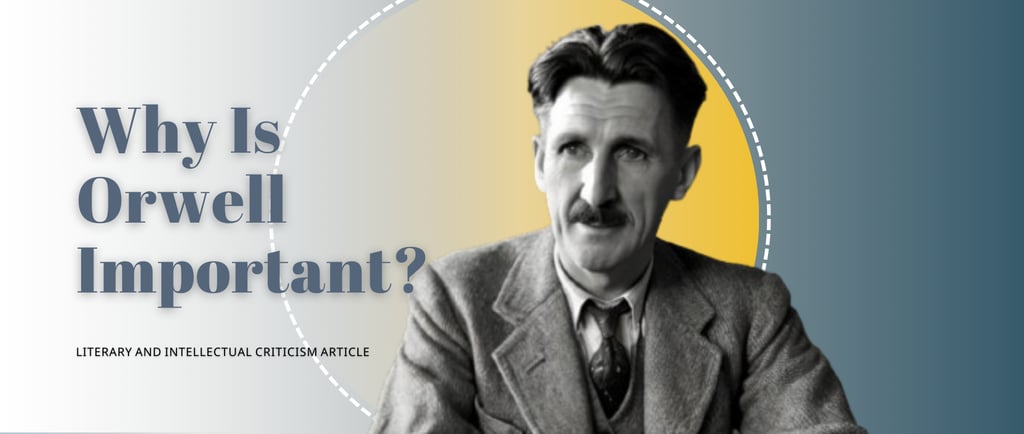Why Is Orwell Important?
Literary and Intellectual Criticism Article
By Omar Alsheikh
4/16/2022



Why Is Orwell Important?
George Orwell (1903–1950) stands as one of the twentieth century’s most influential writers, renowned for his incisive critiques of totalitarianism, social injustice, and the subtle (and not-so-subtle) manipulations of language. Born Eric Arthur Blair in colonial India, Orwell’s early years spanned multiple worlds: an upbringing shaped by imperial service, followed by an education in England that exposed him to the rigidities of the British class system. His experiences—serving in the Indian Imperial Police in Burma, living among the working classes in London and Paris, and later taking up arms in the Spanish Civil War—would all converge into a distinctive literary voice. This voice, marked by moral clarity and a keen sense of political insight, remains a guiding light for those seeking to decipher the labyrinth of modern power structures and media spin.
In the following sections, we will explore three central dimensions of Orwell’s significance: his formative experiences and the evolution of his moral vision, the key stylistic and thematic features of his writing, and the enduring resonance of his two major novels—Animal Farm (1945) and Nineteen Eighty-Four (1949)—in contemporary discourse. By delving into these areas, we can better appreciate how Orwell transformed his firsthand observations into timeless narratives about authority, freedom, and the human capacity to resist oppression.
From Imperial Policeman to Political Critic
To understand Orwell’s pivotal role, it is crucial to examine the development of his moral and political compass—much of which took shape during his early adult years. After completing his schooling at Eton College, he served as a police officer in Burma, part of Britain’s colonial machinery. The experience left him disillusioned with imperialism. He witnessed up close the harsh stratifications of colonial rule and the resentment it brewed among the local population. In his essay “Shooting an Elephant,” Orwell vividly recounts an episode in which he felt compelled to shoot an elephant to maintain the facade of colonial authority. The moral conflict at the essay’s heart—his recognition of imperial cruelty juxtaposed against his own complicity—illustrates the complexity that would define his later writings.
Upon resigning from the police, he plunged himself into a life of deliberate poverty, drifting through London’s slums and working menial jobs in Paris. These raw encounters with economic hardship solidified his sympathy for the downtrodden. Down and Out in Paris and London (1933) emerged from this period, shedding light on the daily realities of the unemployed and homeless. Through these formative experiences, Orwell honed a double-edged sensibility: a fierce empathy for society’s underdogs alongside an unwavering skepticism of institutional power, be it imperial rule, rigid class hierarchies, or utopian ideologies.
This worldview was further shaped by his participation in the Spanish Civil War on the Republican side. Orwell joined a left-wing militia in Catalonia, only to find himself embroiled in factional infighting and targeted by Stalinist allies-turned-enemies. Disgusted by the betrayal and propaganda on both sides, he left Spain disillusioned with any ideology that justified authoritarian methods under the guise of progressive aims. These trials, recorded in his memoir Homage to Catalonia (1938), crystalized Orwell’s conviction that totalitarianism—regardless of its ideological banner—was anathema to basic human dignity.
Stylistic Hallmarks: Clarity, Honesty, and the Politics of Language
Parallel to these life events was the shaping of Orwell’s literary style and philosophical concerns—particularly his dedication to clear, unadorned prose. He believed that convoluted or pompous language often served as a smokescreen, cloaking manipulative intentions. In his famous essay “Politics and the English Language” (1946), Orwell argued that vague, euphemistic rhetoric frequently facilitates deceptive politics. “If thought corrupts language,” he wrote, “language can also corrupt thought,” a line that resonates across his work. In Orwell’s view, precise and direct writing was an ethical imperative, a defense against propaganda and mental complacency.
As a result, his writing style is marked by its simplicity, directness, and moral urgency. Orwell cuts through obfuscations to reveal the underlying power relations at play. This stylistic clarity complements the thematic focus of his major works, which revolve around the individual struggling against oppressive regimes and cultural orthodoxies. While these themes are found in his essays and early novels, it is in his two iconic works—Animal Farm and Nineteen Eighty-Four—that they reach their most potent expressions.
In Animal Farm, subtitled “A Fairy Story,” Orwell employs a deceptively simple fable to expose the corruption of revolutionary ideals. The animals’ rebellion against the negligent Farmer Jones reflects the Russian Revolution of 1917, only for them to fall under the even harsher tyranny of Napoleon the pig, mirroring the rise of Stalin. This dark allegory warns that all revolutions risk being co-opted by individuals who exploit propaganda, scapegoating, and terror to cement their control.
In Nineteen Eighty-Four, perhaps his most enduring work, Orwell imagines a dystopian future in which the Party exerts total control over its citizens through relentless surveillance, manipulation of history, and the insidious language of “Newspeak.” The protagonist, Winston Smith, struggles to keep alive even a flicker of autonomy and truth in a world where “Big Brother is watching.” Through terms like “doublethink,” Orwell illustrates how a regime can shape not just public behavior but internal reality—people come to believe what they are told, even when it contradicts their senses.
Contemporary Resonance:
Surveillance, Disinformation, and the Fight for Freedom
Orwell’s portrayal of an all-seeing authority and the manipulation of information feels uncannily prescient in the digital age. Advances in technology have furnished governments and corporations with the means to track, profile, and influence citizens at unprecedented levels. Debates on data privacy, corporate surveillance, and algorithmic biases echo Orwell’s warning about how easily personal freedoms can be eroded under the guise of security or progress. The phrase “Big Brother” has come to define our cultural discourse on surveillance, while instances of deceptive political speech are routinely referred to as “Orwellian.”
In addition, the contemporary problem of disinformation—through social media echo chambers and state-sponsored propaganda—highlights the enduring relevance of Orwell’s critique of language. The prevalence of “fake news,” “post-truth,” and spin-driven agendas offers modern parallels to the reality-shaping methods of the Party in Nineteen Eighty-Four. Orwell’s insight that controlling language means controlling thought remains alarmingly tangible. If facts become subjective or malleable, the very concept of objective reality collapses, giving free rein to charismatic demagogues and manipulative power structures.
On a broader scale, Orwell’s defense of political freedoms and his skepticism of dogmatic ideologies also maintains great significance. He underscored the importance of holding authorities to account—a sentiment that resonates across democracies and authoritarian states alike. Whether we witness novel forms of digital censorship or the creeping normalization of lies in political discourse, Orwell’s message remains that complacency is the fuel that authoritarianism most ardently desires.
So, Why Is Orwell Important?
He endures not just as a fierce critic of totalitarianism but as an essential guide to the power of language in shaping reality. Through Animal Farm and Nineteen Eighty-Four, Orwell warned that the gravest threats to freedom often come wrapped in the rhetoric of progress and security. His commitment to clarity in expression and moral integrity in politics echoes in ongoing dialogues about fake news, surveillance, and ideological manipulation. In reading Orwell, we confront the uncomfortable truth that we, too, can be complicit if we fail to question those who would rewrite history, distort language, and manipulate perceptions. As long as societies wrestle with power imbalances and propaganda—whether from governments or private entities—George Orwell will remain vital, reminding us that honesty, skepticism, and a willingness to stand against oppressive forces lie at the heart of genuine freedom.
